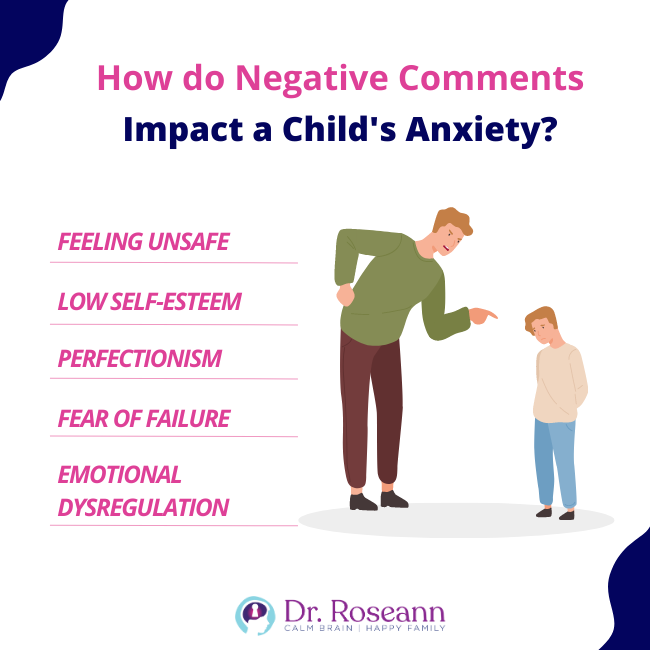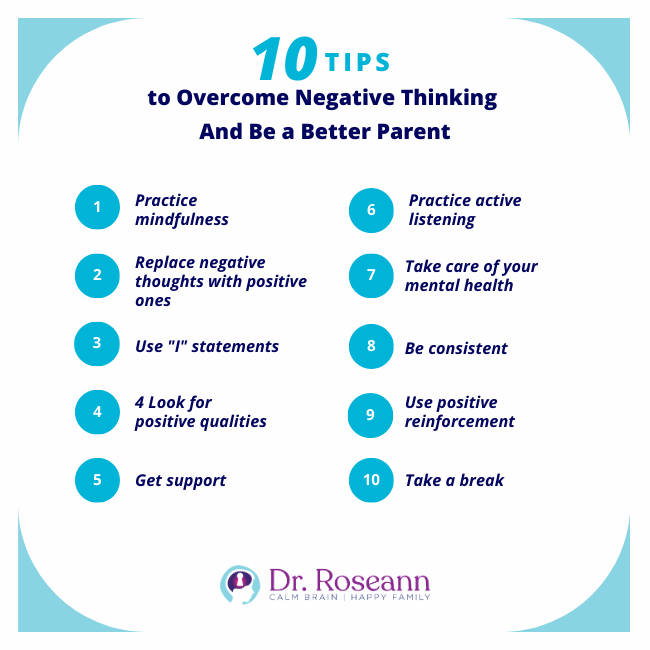Having a child who leans toward the negative or is outright a “no!” kind of kid can challenge parents. The brain's negativity bias is a piece of this puzzle as to why your child is a glass-half-empty type of kid (and maybe you, too!).
Summer was an anxious teen with perfectionistic tendencies. Her parents came to me with concerns about her stress and inconsistent academic performance. While she had clinical anxiety levels, it was inadvertently fueled by her perfectionistic and critical parents. They thought they were being helpful by pushing Summer but instead were causing her to shut down.
The good news is that positive psychology shows us that we can overcome negativity bias when we directly address negative thoughts and behaviors by paying attention to what we say and do. And how we parent and the different parenting styles can make a huge difference in a child's lifelong mental health.
In the case of Summer, the whole family learned all the ways that negative thinking hurts us and exactly how to nix that negativity bias. And that is so important for our and our child's mental health.
What is a Negative Bias?
A negative or negativity bias is a psychological phenomenon in which people are more likely to pay attention to and remember negative information, experiences, or events than positive ones. In other words, people tend to focus more on negative aspects of their environment or incidents and give them greater weight or importance than positive ones.
This bias is believed to have evolutionary origins. It goes back to the time of cave dwellers. In the past, paying attention to potential threats or dangers was essential for survival, so our brains became wired to prioritize negative information. Cultural and social factors and individual differences in personality and life experiences may also influence this bias.
Our brain is wired to see a negative in a quarter of a second. In contrast, it takes 20 seconds for the brain to see a positive. That means one has to work actively to counter their negativity bias.
A negative bias can affect our thoughts, feelings, and behaviors. For those that get more stuck in a negative thinking pattern, harmful speech, or behavioral patterns, it can wreak havoc on a person's or a child's life.
These behaviors can lead to clinical issues as well. For example, it can contribute to anxiety, depression, other mental health conditions, and a tendency to ruminate or dwell on adverse events or experiences. It can also affect our social interactions by making us more likely to perceive and remember negative interactions.
It's essential to be aware of our own negative biases and to work on countering them by focusing on positive experiences and emotions. It can help to promote more balanced and healthy thinking patterns and improve our overall mental health and well-being.
How Does a Negative Bias Affect Parenting?
A negative bias can have a significant impact on parenting. When parents focus on negative aspects of their child's behavior or performance, it can lead to negative comments and criticism, which can harm the child's self-esteem, emotional well-being, and relationship with their parent. It can also contribute to anxiety, depression, and other mental health conditions in children.
For example, if a parent has a negative bias, they may focus more on their child's mistakes or shortcomings than their strengths and accomplishments. This tendency to focus on the gaps rather than the gains can lead to constant negative comments and criticism, making the child feel like they are never good enough.
Over time, parental criticism can damage the child's self-esteem and confidence, making them more likely to engage in negative behaviors or even develop mental health issues such as anxiety, OCD, and depression.
Our all-or-nothing society has made so many kids and teens feel that they aren't good enough if it isn't 100 percent perfect. That means we need to recognize all those micro gains we make as we work towards the win.
A negative bias can break down parent-child communication and contribute to a cycle of negative interactions between parents and children, leaving both feeling impasse.
For example, suppose a parent is constantly critical of their child. In that case, the child may become defensive or unresponsive, further exacerbating the parent's negative feelings and leading to even more negative interactions. It can create a vicious cycle that is difficult to break, leading to a strained relationship between the parent and child.
How Does A Parent Pass The Negativity Bias to Their Kids?
It is easy to pass on our negativity bias to our children when we aren't consciously trying to counter it. No one wants to be a toxic parent, but it can be hard to break inherited parenting patterns if we aren't conscious of them.
Parents can pass on a negative bias to their kids in several ways. Here are a few examples:
- Modeling
- Reinforcement
- Communication
- Negative Experiences
Through modeling
Children learn a lot from observing the behavior of their parents and other adults. For example, let's suppose a parent has a negative bias. In that case, they may model negative thought patterns, such as focusing on the negative aspects of situations or people and making negative comments or criticisms. Children may then adopt similar thought patterns and behaviors.
Through reinforcement
If a parent responds more positively to negative behaviors than positive ones, they may unintentionally reinforce a negative bias in their child. For example, if a child is praised for pointing out flaws or problems, they may learn to focus on the negative aspects of situations and overlook the positive ones.
Through communication
If a parent frequently comments or criticizes their child, they may inadvertently communicate a negative bias. It can make the child feel like they are not good enough and can damage their self-esteem and confidence.
Through negative experiences
If a child experiences adverse events or traumas, such as bullying or abuse, they may develop a negative bias to cope with these experiences. In addition, if a parent is not supportive or does not provide positive reinforcement, it will reinforce the bias over time.
To avoid passing on a negative bias to their children, parents can work to be mindful of their thought patterns and behaviors and focus on positive reinforcement and communication with their children. It includes providing praise and encouragement for positive behaviors, modeling positive thought patterns, and being supportive and empathetic when their child experiences negative situations or emotions.
How do Negative Comments Impact a Child's Anxiety?

Negative comments from a parent can significantly impact a child's anxiety. Focusing on what a child is doing “wrong” is stressful for both the child and the parent. Children are susceptible to the words and actions of their parents, and they often internalize what they hear.
Chronic stress can lead to clinical mental health issues such as anxiety, OCD, depression, and other clinical problems. Research shows that even negative body language can increase anger and social anxiety in children (Gulley, Oppenheimer & Hankin, 2014). At a minimum, it will always make a child feel insecure, unsure, and unloved.
Here are a few ways in which negative comments from a parent can worsen a child's anxiety:
- Feeling unsafe: When a parent comments negatively, a child may feel unsafe at home. It can make them feel anxious and worried about their safety, even when no immediate danger exists.
- Low self-esteem: Negative comments from a parent can make a child feel like they are not good enough or doing something wrong. It can lead to low self-esteem and feelings of inadequacy, worsening anxiety, and leading to poor decision-making and high-risk behaviors.
- Perfectionism: Negative comments can also lead to perfectionism, as a child may feel they must constantly strive for perfection to avoid criticism from their parent. It can be exhausting, contribute to anxiety, and, in some cases, lead to obsessive-compulsive thinking and behaviors.
- Fear of failure: Negative comments can make a child afraid to make mistakes or take risks for fear of being criticized or ridiculed. It can lead to anxiety around trying new things or taking on new challenges and hold them back from their full potential.
- Emotional dysregulation: Negative comments can also contribute to emotional dysregulation, as a child may struggle to manage their feelings of anxiety, sadness, or anger in response to the criticism from their parent. When a child is unsure and insecure, they cannot cope, which is a source of anxiety.
Negative comments from a parent can significantly impact a child's mental health and well-being. We all know what it is like when we are around someone supercritical, like your aunt Barabara, and you probably avoid her like the plague because they make you feel like you can't do anything right.
It's essential for parents to be mindful of the words they use and to make an effort to create a safe and supportive environment for their children. We want our children to have a range of positive and negative emotions. When they receive only critical feedback, it becomes difficult for a child to discern or even experience anything but anger. Developing positive emotions in a child is essential and starts with mom, dad, and caregivers.
Emotional regulation is affected by the family ecosystem, and there are strategies to build emotional regulation in kids. The parent-child relationship and communication foster calming the brain and making kids feel good about themselves.
If a parent struggles with their own negative bias, negative self-talk, and mental health or finds it challenging to manage their emotions, seeking support from a mental health professional may be helpful. In addition, parent coaching will have a positive impact on your relationship.
How Can Parents Counter A Negativity Bias in Parenting?
Parents need to consider what is causing them to be harmful to overcome the negativity bias in parenting. Most of us learn to parent from our parents, so looking at family parenting patterns is an essential first step. Ask yourself, “Am I reinforcing the behavior I want to see in my child or just being critical?” If it isn't shaping desired behavior positively, then from a behavioral perspective, you are just spinning your wheels.
Your self-regulation is paramount in having the brain space to manage cranky, unruly, or dysregulated kids. Kids regulate off of us, which means they can share in our calm. Co-regulation is all about “sharing your calm.”
Parents can build self-regulation and a positive outlook in themselves and their children when they practice mindfulness and self-awareness and use positive reinforcement. It includes paying attention to positive aspects of their child's behavior, providing praise and encouragement for good behavior, and developing a positive and supportive relationship with their child. By focusing on positive interactions and reinforcing positive behaviors, parents can help build their child's self-esteem, confidence, and emotional well-being while improving their relationship with their child.
It can be challenging to break this pattern if you're a parent who struggles with negative thinking or making negative comments. However, researchers like Dr. Rick Hanson believe we can overcome negativity bias. You can take steps to change your thought patterns and improve your interactions with your children.
10 Tips to Overcome Negative Thinking And Be a Better Parent

#1 Practice mindfulness
Mindfulness is being present and fully engaged in the moment without judgment. It can help you become more aware of your thoughts and feelings and better recognize and interrupt negative thought patterns. Many mindfulness practices, such as deep breathing or meditation, can help you develop this skill.
#2 Replace negative thoughts with positive ones
When you make negative comments or thoughts, try to replace them with positive ones. For example, instead of saying, “You always make a mess,” try saying, “Let's work together to keep the house tidy.”
#3 Use “I” statements
Instead of commenting negatively about your child, try using “I” statements to express your feelings. For example, instead of saying “You're so lazy,” try saying “I feel frustrated when the chores aren't done.”
#4 Look for positive qualities
Make an effort to focus on your child's positive qualities and behaviors, and express your appreciation for them. It can help to build a positive relationship and reinforce positive behaviors.
#5 Get support
If you're struggling with negative thinking or behaviors, seeking support from a mental health professional can be helpful. We provide guidance and tools to help you change your thought patterns, improve your interactions with your child, and calm the brain. In addition, our CALM PEMF™ portable device allows parents and kids to “Be calm anywhere, anytime™.”
#6 Practice active listening
When your child is speaking to you, try to actively listen to what they're saying. Avoid interrupting or dismissing their thoughts and feelings, and try to respond in a supportive and empathetic way. It can help to build trust and improve communication between you and your child.
#7 Take care of your mental health
If you're struggling with your mental health, it can be challenging to maintain a positive outlook and avoid negative comments. Make sure you're taking care of your needs, such as getting enough rest, eating well, and seeking support when needed.
#8 Be consistent
Children thrive on consistency and routine and may become anxious or confused when rules and expectations change frequently. Therefore, be consistent in your interactions with your child and provide clear expectations and consequences for their behavior.
#9 Use positive reinforcement
Instead of criticizing your child for negative behaviors, try using positive reinforcement to encourage positive behaviors. For example, if your child completes a task or behaves well in a specific situation, offer them praise or a small reward. It can help to reinforce positive behaviors and build your child's self-esteem.
#10 Take a break
If you feel overwhelmed or frustrated, taking a break and stepping away from the situation is okay. Take a few deep breaths, walk, or engage in an activity that helps you feel calm and centered. It can help you to avoid reacting negatively and promote a more positive interaction with your child.
Remember that changing your thought patterns and behaviors takes time and practice. Be patient with yourself, and focus on making small, positive changes each day. With patience, practice, and support, you can learn to identify and interrupt negative patterns and replace them with positive and supportive interactions. Over time, these changes can add up and help you build a more positive and supportive relationship with your child.
Citations:
Gulley, L. D., Oppenheimer, C. W., & Hankin, B. L. (2014). Associations among negative parenting, attention bias to anger, and social anxiety among youth. Developmental psychology, 50(2), 577–585. https://doi.org/10.1037/a0033624
Sanders, M. R., Kirby, J. N., Tellegen, C. L., & Day, J. J. (2014). The Triple P-Positive Parenting Program: a systematic review and meta-analysis of a multi-level system of parenting support. Clinical psychology review, 34(4), 337–357. https://doi.org/10.1016/j.cpr.2014.04.003
Slatcher, R. B., & Trentacosta, C. J. (2012). Influences of parent and child negative emotionality on young children's everyday behaviors. Emotion (Washington, D.C.), 12(5), 932–942. https://doi.org/10.1037/a0027148
Tabibnia, G., Lieberman, M. D., & Craske, M. G. (2008). The lasting effect of words on feelings: words may facilitate exposure effects to threatening images. Emotion (Washington, D.C.), 8(3), 307–317. https://doi.org/10.1037/1528-3542.8.3.307
Always remember… “Calm Brain, Happy Family™”
Are you looking for SOLUTIONS for your struggling child or teen?
Dr. Roseann and her team are all about solutions, so you are in the right place!
There are 3 ways to work with Dr. Roseann:
You can get her books for parents and professionals, including: It’s Gonna Be OK™: Proven Ways to Improve Your Child’s Mental Health, Teletherapy Toolkit™ and Brain Under Attack: A Resource For Parents and Caregivers of Children With PANS, PANDAS, and Autoimmune Encephalopathy.
If you are a business or organization that needs proactive guidance to support employee mental health or an organization looking for a brand representative, check out Dr. Roseann’s media page and professional speaking page to see how we can work together.
Dr. Roseann is a Children’s Mental Health Expert and Therapist who has been featured in/on hundreds of media outlets including, CBS, NBC, FOX News, PIX11 NYC, The New York Times, The Washington Post,, Business Insider, USA Today, CNET, Marth Stewart, and PARENTS. FORBES called her, “A thought leader in children’s mental health.”

She is the founder and director of The Global Institute of Children’s Mental Health and Dr. Roseann Capanna-Hodge. Dr. Roseann is a Board Certified Neurofeedback (BCN) Practitioner, a Board Member of the Northeast Region Biofeedback Society (NRBS), Certified Integrative Medicine Mental Health Provider (CMHIMP) and an Amen Clinic Certified Brain Health Coach. She is also a member of The International Lyme Disease and Associated Disease Society (ILADS), The American Psychological Association (APA), Anxiety and Depression Association of America (ADAA) National Association of School Psychologists (NASP), International OCD Foundation (IOCDF) International Society for Neurofeedback and Research (ISNR) and The Association of Applied Psychophysiology and Biofeedback (AAPB).
© Roseann-Capanna-Hodge, LLC 2023
Disclaimer: This article is not intended to give health advice and it is recommended to consult with a physician before beginning any new wellness regime. *The effectiveness of diagnosis and treatment vary by patient and condition. Dr. Roseann Capanna-Hodge, LLC does not guarantee certain results.













